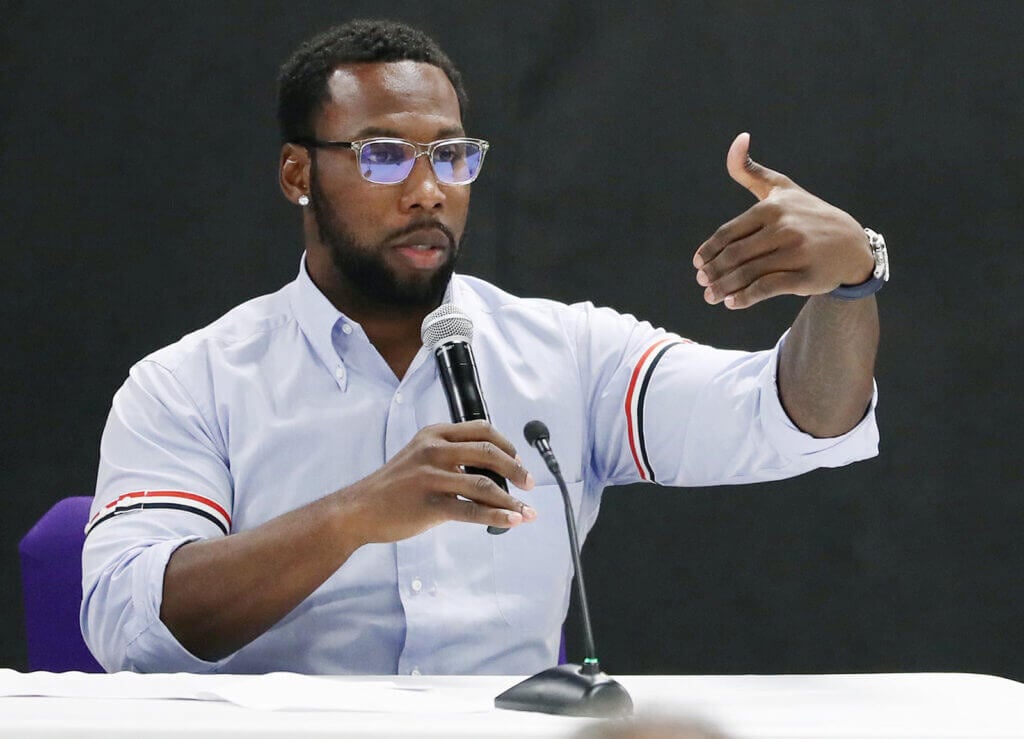In 2016, a small group of NFL players had a big idea: come together to form a nonprofit where they could advocate for racial equity and social justice.
The result was the Players Coalition, which “worked with more than 1,400 professional athletes, coaches and owners of major professional sports leagues” to have a contribution to some legislative victories. in criminal justice and voter rights reform.
However, today, in addition to the struggle to protect the rights and opportunities of others, the organization is fighting to protect the federally trademarked name, which it claims the National Hockey League began to violate three months ago. to launch the “NHL Player Inclusion Coalition. .”
Players Coalition officials contend the name is too close to their own, which could cause the public to mistakenly believe the groups are affiliated or work together as part of a larger organization.
“The Players Coalition has achieved goodwill and positive recognition across social-justice and athletic impact over the past six years and we are proud of all that we have accomplished,” co-founder Anquan Boldin told The Athletic. “We stand behind the quality and integrity of our work and must protect our brand and mission. That starts with protecting our trademark rights.”
Jia Wang, senior counsel and trademark expert for the NHL, did not immediately return an email from The Athletic looking for comments. He was informed of the concerns of the Players Coalition about a week before the league launched the new initiative.
In part, his written response to the Players Coalition said: “The name of our group is the ‘NHL Player Inclusion Coalition,’ and we plan to always market it as such. And this name, simply, describes what our program is – a coalition of current and former hockey players brought together by the NHL and its players to promote equality and inclusion through and within hockey in particular, both on the ice for players and participant, and off the ice for those who work in and around the game. As ‘Inclusion’ is not a generic word here – it is an important part of our name that explains what kind of our coalition.
He added: “Additionally, distinctive NHL and/or NHLPA trademarks will appear on our coalition name and its associated branding, to help distinguish our coalition from others. This hockey-focused goal/mission of the NHL Player Inclusion Coalition does not have this goal of criminal justice reform or social equality more broadly through civic action, as is clearly described on your website and in your trademark registration. For this and more reasons, our initiatives can go hand in hand and the public is less likely to be confused.”
The Players Coalition disagrees. It highlighted that in the days following the launch, media sites often referred to the group as the “Player Inclusion Coalition” dropping “NHL” as part of the official title. Many of the stories were found in the pages of hockey, but what is more about PC officials is that the initiative is often called “coalition” in the second reference.
Representatives of the Players Coalition sent examples of potential violations in a cease and desist letter to the NHL on June 30. Wang, in writing, argued that the NHL did not violate trademark protections, concluding: ” The NHL and its partners still do not see the need to change the name, branding or related activities of the NHL Player Inclusion Coalition.
If the sides can’t reach an amicable solution, the next step could be a formal trademark infringement complaint from the Players Coalition, which earlier this year extended its partnership with the NFL for an additional five years and $15 million in grants.
The sides first teamed up in 2018, under what the league now calls the Inspire Change Initiative. Since then, the NFL and its teams, along with the players, have exceeded the initial 10-year, $250 million agreement that committed to combating systemic racism by 2020.
The voice and energy of the nonprofit, combined with the financial commitment from the owners and players, played a part in the following legislative victories:
– Michigan ended the practice of prosecuting minors as adults by raising the age from 17 to 18 years.
– Florida restored voting rights to 1.4 million citizens with previous felony convictions.
– Louisiana restored voting rights to thousands of citizens with past felony convictions.
— Massachusetts commits $1.5 billion in new funding for public schools.
— Maryland passed the “Blueprint for Maryland’s Future,” an education bill that will provide much-needed funding and critical policy changes to create equity in public education across the state.
— Philadelphia passes the “Driving Equality Bill,” which would prevent police officers from pulling over drivers for low-level vehicle violations such as broken tail lights.
– Kentucky established a partial ban on no-knock warrants.
“In 2020, after the police killed George Floyd, the entire country weighed in on the fight for racial justice,” Players Coalition co-founder and 13-year NFL vet Malcolm Jenkins said. NFL.com during the extension. “Unfortunately, voices have diminished, and much ‘advocacy’ has been reduced to simple Twitter messages. The work, however, remains as critical and urgent as ever.
That work is very specific, so the NHL argues that there should be no confusion between its goal of increasing inclusion and diversity within hockey and what the Players Coalition does. The PC obviously disagrees, setting the stage for a potential legal battle.
(Photo of Anquan Boldin: Stephen M. Dowell / Orlando Sentinel / Tribune News Service via Getty Images)
